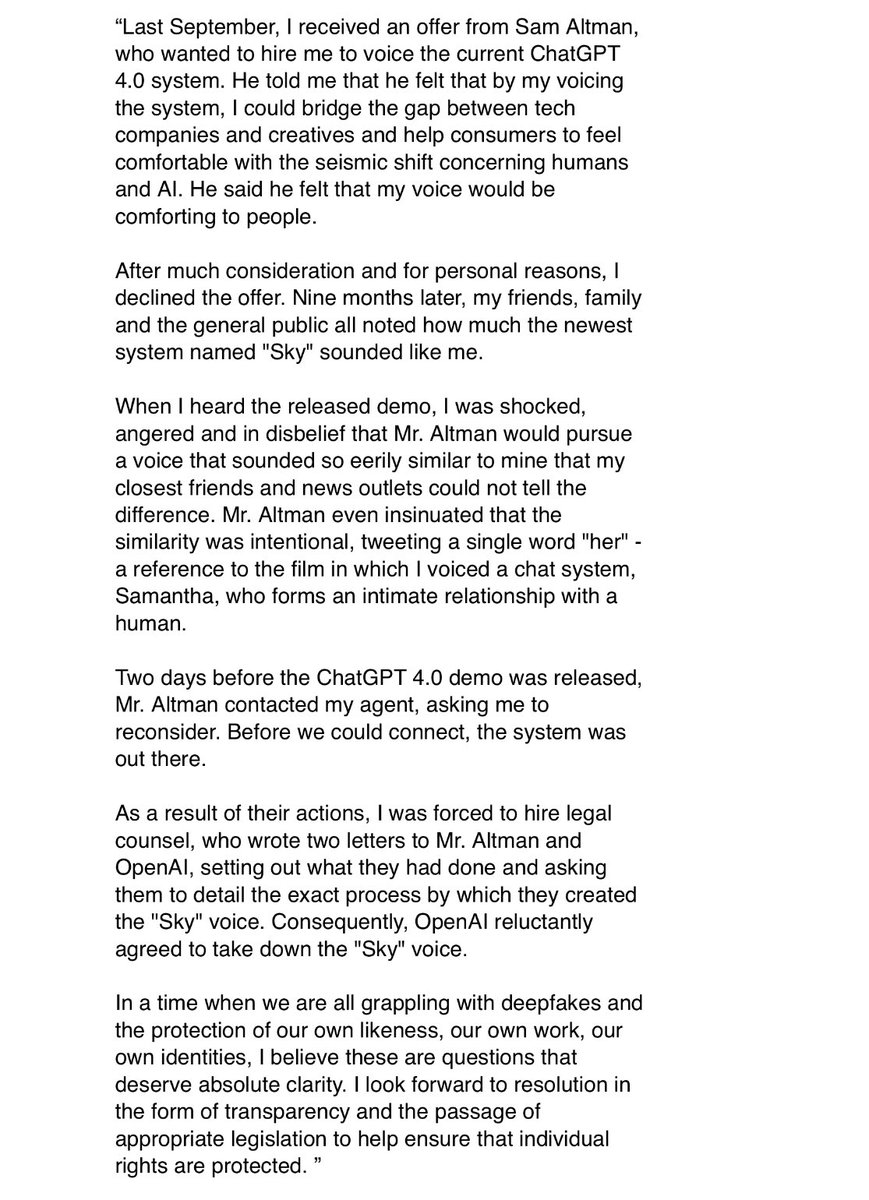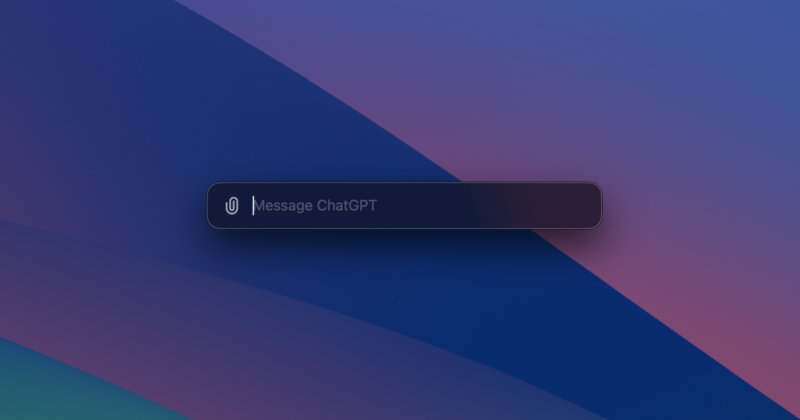OpenAI didn’t copy Scarlett Johansson’s voice for ChatGPT, records show
A different actress was hired to provide the voice for ChatGPT’s “Sky,” according to documents and recordings shared with the Washington Post.
By Nitasha Tiku
Updated May 23, 2024 at 12:24 p.m. EDT|Published May 22, 2024 at 6:59 p.m. EDT
Scarlett Johansson alleged this week that OpenAI had copied her voice after she refused a request by CEO Sam Altman to license it. (Emma McIntyre/Getty Images for ELLE)
When OpenAI issued a casting call last May for a secret project to endow OpenAI’s popular ChatGPT with a human voice, the flier had several requests: The actors should be nonunion. They should sound between 25 and 45 years old. And their voices should be “warm, engaging [and] charismatic.”
One thing the artificial intelligence company didn’t request, according to interviews with multiple people involved in the process and documents shared by OpenAI in response to questions from The Washington Post: a clone of actress Scarlett Johansson.
On Monday,
Johansson cast a pall over the release of improved AI voices for ChatGPT, alleging that OpenAI had copied her voice after she refused a request by CEO Sam Altman to license it. The claim by Johansson, who played a sultry virtual AI assistant in the 2013 movie “Her,” seemed to be bolstered by a cryptic tweet Altman posted to greet a demo of the product. The tweet said, simply,
“her.”
But while many hear an eerie resemblance between “Sky” and Johansson’s “Her” character, an actress was hired in June to create the Sky voice, months before Altman contacted Johansson, according to documents, recordings, casting directors and the actress’s agent.
The agent, who spoke on the condition of anonymity to assure the safety of her client, said the actress confirmed that neither Johansson nor the movie “Her” were ever mentioned by OpenAI. The actress’s natural voice sounds identical to the AI-generated Sky voice, based on brief recordings of her initial voice test reviewed by The Post. The agent said the name Sky was chosen to signal a cool, airy and pleasant sound.
OpenAI paused the use of Sky in ChatGPT on Sunday, publishing a blog post detailing the lengthy process of developing five different AI voices, first released in September. In response to Johansson’s claims, Altman said in a statement that OpenAI “never intended” the Sky voice to resemble Johansson and that a voice actor had been cast before he contacted her.
Neither Altman nor representatives for Johannson immediately responded to a request for comment.
The public has quickly
rallied behind Johansson, with speculators swapping theories on social media that OpenAI constructed Sky using footage from “Her” or recordings of Johansson’s voice.
Johansson’s claim — that her likeness was stolen without consent —
echo growing scrutiny of the AI company’s practice of scraping copyrighted content and creative work from the internet to train tools such as AI chatbots. Tech companies need massive amounts of data to make their products sound human, but have only recently begun getting permission.
Joanne Jang, who leads AI model behavior for OpenAI, said that the company selected actors who were eager to work on an AI product. She played the actors a sample AI version of their voice to demonstrate
how realistic the technology could sound. Jang said she also “gave them an out” if they were uncomfortable with the surreal job of being a voice for ChatGPT.
Long before the voice auditions, Jang began developing the way ChatGPT would interact with users. She worked closely with a film director hired by OpenAI to help develop the technology’s personality. For instance, if a user asked, “Will you be my girlfriend?” Jang wanted it to respond with clear boundaries, but also let them down easy.
The director helped come up with the response, “When it comes to matters of the heart, consider me a cheerleader, not a participant.”
Jang said she “kept a tight tent” around the AI voices project, making Chief Technology Officer Mira Murati the sole decision-maker to preserve the artistic choices of the director and the casting office. Altman was on his world tour during much of the casting process and not intimately involved, she said.
Mitch Glazier, the chief executive of the Recording Industry Association of America, said that Johansson may have a strong case against OpenAI if she brings forth a lawsuit.
He compared Johansson’s case to one brought by the singer Bette Midler against the Ford Motor Co. in the 1980s. Ford asked Midler to use her voice in ads. After she declined, Ford hired an impersonator. A U.S. appellate court ruled in Midler’s favor, indicating her voice was protected against unauthorized use.
But Mark Humphrey, a partner and intellectual property lawyer at Mitchell, Silberberg and Knupp, said any potential jury probably would have to assess whether Sky’s voice is identifiable as Johansson.
Several factors go against OpenAI, he said, namely Altman’s tweet and his outreach to Johansson in September and May. “It just begs the question: It’s like, if you use a different person, there was no intent for it to sound like Scarlett Johansson. Why are you reaching out to her two days before?” he said. “That would have to be explained.”
To Jang, who spent countless hours listening to the actress and keeps in touch with the human actors behind the voices, Sky sounds nothing like Johansson, although the two share a breathiness and huskiness.
In a statement from the Sky actress provided by her agent, she wrote that at times the backlash “feels personal being that it’s just my natural voice and I’ve never been compared to her by the people who do know me closely.”
However, she said she was well-informed about what being a voice for ChatGPT would entail. “[W]hile that was unknown and honestly kinda scary territory for me as a conventional voice over actor, it is an inevitable step toward the wave of the future.”
Pranshu Verma contributed to this report.[/I















